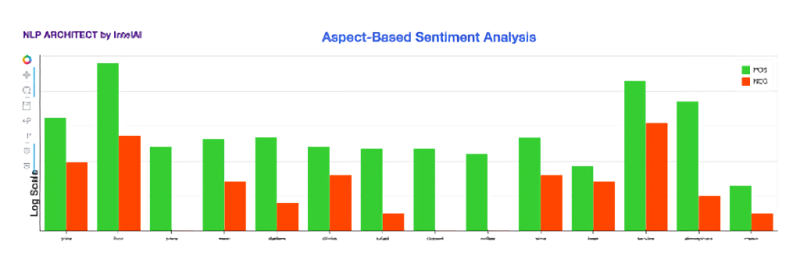Watch all the Transform 2020 sessions on-demand here.
Last year, Intel’s AI Lab — a cross-disciplinary team of machine learning researchers and engineers, data scientists, and neuroscientists — unveiled NLP Architect, an open source library of AI models, coding notebooks, and frameworks purpose-built for a range of natural language processing tasks. One application it didn’t target was sentiment analysis, which involves detecting subjective information from text, but that’s changing courtesy a newly announced update.
Intel today revealed that as of version 0.4, NLP Architect includes models for a particular type of sentiment analysis dubbed aspect-based sentiment analysis (ABSA). Intel notes that it’s generally more accurate than the commonly deployed alternative, sentence-level sentiment analysis, which achieves high accuracy but fails to account for nuances within phrases (for example, when one aspect of the sentence is positive while another is negative).
ABSA works by extracting aspect terms — words like “food” and “service” in the sentence “The food was tasty but the service was poor” — and determining their related sentiment “polarity” (i.e., whether they expressed positive or negative sentiment). It’s more challenging than it sounds; aspects are often domain-sensitive and share close semantic similarity. For instance, an opinion that might be considered positive in the context of a movie review (e.g. “delicate”) may be negative in another (a cell phone review).

Above: Sentiment analysis in Intel’s NLP Architect.
Supervised learning approaches, which rely on large data sets of annotated samples, handle domain sensitivity pretty well, but Intel notes that compiling the necessary corpora is labor- and time-intensive. That’s why their ABSA model is lightly supervised, meaning it’s able to ingest unlabeled text and output opinion and aspect lexicons after domain-specific lexicons are defined.
June 5th: The AI Audit in NYC
Join us next week in NYC to engage with top executive leaders, delving into strategies for auditing AI models to ensure fairness, optimal performance, and ethical compliance across diverse organizations. Secure your attendance for this exclusive invite-only event.
“Sentiment analysis is widely used by business organizations to understand customer opinions on products and services, enabling the ability to react accordingly,” wrote Intel senior deep learning data scientist Oren Pereg, deep learning research group manager Moshe Wasserblat, and deep learning data scientist Daniel Korat in a blog post. “ABSA [is an] effective application for organizations to monitor the ratio of positive to negative sentiment expressed towards specific aspects of a product or service, and extract valuable targeted insight.”
ABSA joins the many existing models in NLP Architect, including:
- Dependency parser (BIST) and NP chunkier models for linguistic feature extraction
- Intent extraction and name entity recognition models optimized for performance
- Semantic understanding models for most common word sense, NP embedding representation, and more
- Dialog system, sequence chunking, and other components for conversational AI
- End-to-end applications using new topologies like Q&A and machine reading comprehension
All of NLP Architect’s models ship with end-to-end examples of training and inference processes and with supporting data pipelines, common functional calls, and other utilities related to natural language processing. They’re modularized for integration, and some of the components are exposed as APIs through Intel’s NLP Architect server, a platform designed to provide predictions across different models. NLP Architect also includes a web frontend for visualizations, plus templates for developers to add new services.


